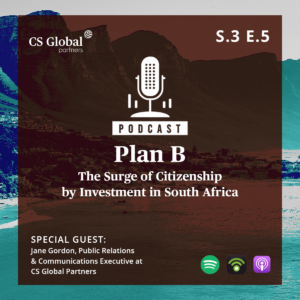
Jane Gordon, the Public Relations & Communications Executive at CS Global Partners, speaks about the surge of South Africans looking for second citizenship.
Aisha Mohammed: In recent years, South Africa has seen a growing exodus of entrepreneurs and business people – whether they do so by obtaining new citizenship or residing in a foreign nation. What do you think are some of the factors driving South Africans?
Jane Gordon: Well, I think South Africans, in particular, want more options, and they want more opportunities. They are really looking to become more globally mobile, which is sometimes hard being based in South Africa. We’re sort of at the end of the globe so to speak. I think South African entrepreneurs especially have a desire to be seen as a bit more competitive, especially on a global scale in terms of business. They are usually very creative so being able to travel more easily for inspiration as well.
Business is a key driving factor as well and then adding in the current times, where people are able to work remotely, more people are working across the world at their desks. You don’t have to be stuck in an office. So if you can, why not choose to work somewhere with a similar lifestyle to South Africa, a similar climate but a place with more opportunities and potentially doesn’t have some of the concerns we have here, such as high crime.
AM: What makes Citizenship by Investment particularly interesting for South Africans looking to obtain second citizenship?
JG: I think it’s an attractive option. I think in South Africa, you’re often very much restricted by obtaining citizenship through ancestry or through a family connection. If you don’t have that, then I think it’s very difficult. Being able to invest in Citizenship by Investment also allows you to choose where you’d like to become a citizen. Whereas in South Africa, you’re quite tied to England or Australia which are often the family connections you have but Citizenship by Investment kind of opens up a whole wealth of opportunities.
AM: How does second citizenship help South Africans with diversifying their wealth portfolio?
JG: Again, it’s about opening up options to invest overseas and out of South Africa is an attractive one because it does feel a bit more secure. The South African rand is particularly weak, and so the overseas investment is quite key. I think it’s seen as a bit of an insurance policy. Moreover, some of the investment opportunities are especially attractive to forward-thinking South Africans. Many of the projects you can invest in aim to counter climate change and things South Africans would be concerned with.
Also Read: Diversifying Your Portfolio with Citizenship by Investment
There’s also a number of local incentives to drive investment in particular sectors, which can facilitate investment and even inspire investors to begin operating in a new sector. So that’s appealing and then the Caribbean, in particular, is seen to have a very stable currency as it’s pegged to the US Dollar. So I think that’s quite attractive to South Africans.
AM: An investment in real estate has become an increasingly popular way to obtain foreign citizenship. Using the Commonwealth of Dominica as an example, how can a South African investor benefit from choosing to buy a property?
JG: In numerous ways, real estate is an interesting proposition because it enables the investor to potentially make a return on the investment is quite a short period of time, three or five years depending on the buyer with the timeframe being longer, or if the buyer is involved in citizenship by investment. Relatively, it’s a short period of time. In Dominica specifically, the government’s only approves a very limited number of projects, and these are all eco-friendly, high-end or boutique resorts. And this means that they are tailored to thrive in a world that is eco-friendly and sustainable. They are easily overseen, which alleviates risk that the development will not be completed to the spec promised by the developer.
AM: South Africa is a Commonwealth country, and therefore shares much with other Commonwealth countries such as Dominica and St Kitts and Nevis. Do you think this plays a role in helping investors choose which country to invest in for second citizenship?
JG: Yes. I think it does. It is easier to best invest in similarly like-minded countries such as Dominica or Saint Kitts and Nevis. There’s also greater certainty in it and a better understanding of the local legal system. You know, which in Commonwealth Nations tends to be based on common law principles. South Africans are all about trust and strong connections, so fellow Commonwealth countries would be high on investors lists.
AM: Safety, both physical and financial, is one of South African investors’ most significant concerns. How are CBI nations like Dominica and St Kitts and Nevis meeting this need?
JG: Both Dominica and St Kitts and Nevis are nations that have very stable governments and low crime rates among the general population. And that’s very appealing to South African investors because it is quite different from what we have back home. I think one of the biggest appeals is that they have the beauty of South Africa, but without the struggles for South Africa.
Investing in dual citizenship in Dominica or St Kitts and Nevis feels like you’re investing in a lifestyle that you’re already comfortable. It’s something you already know, and it’s idyllic, but it’s safe. So it’s got those added benefits. You are looking at a place with feels like home, but it feels like the perfect version of home where we don’t have the troubles that sometimes South Africans face.
Also Read: Protect Your Family from the Comfort of Home
This interview has been edited and condensed for length and clarity.